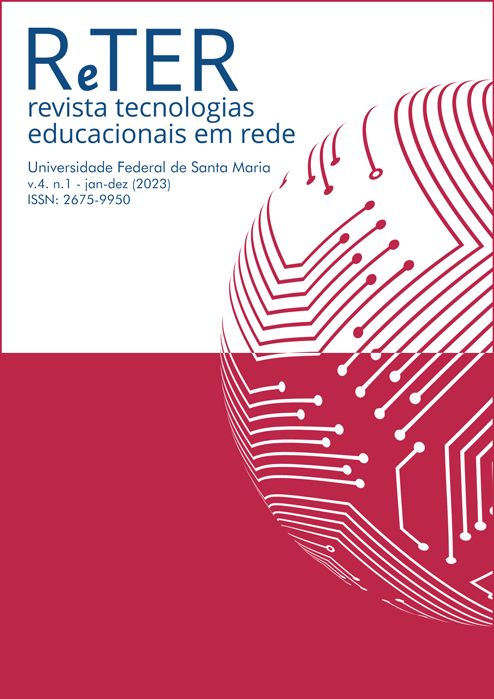QUALITY ANALYSIS OF THE STOPOTS GAME TO REVIEW TYPES OF NOUNS IN ELEMENTARY EDUCATION
DOI:
https://doi.org/10.5902/2675995071740Keywords:
Educational app, Evaluation, Educational gameAbstract
More and more teachers are appropriating educational applications with the aim of helping students in the teaching and learning process. In this article, we present the evaluation of a free digital version of the game “Stopots Online”, developed by Onrizon Games. This game takes up the concepts of the traditional Stop or Adedonha game, as it is popularly known. In the case under study, the game was optimized so that fifth-year elementary school students could understand the classification of nouns, which refers to common or proper nouns, concrete or abstract, primitive or derived, simple or compound, and finally, collective. The research was carried out through a non-experimental case study, following the MEEGA+ method, for evaluating educational games (PETRI; WANGENHEIM; BORGATO, 2018). Data collection was performed shortly after application of the game. As main results obtained from the point of view of the subjects of this research, the game presents a good usability and provides a positive experience to the player, being only necessary to adjust the number of questions to be filled out and the time allotted to answer them. The results of this study can help teachers to adopt such a game in their pedagogical practices and thus be able to provide playful learning experiences for their students.
Downloads
References
BALDINO, José Maria; NICOLODI; JÚNIOR Elaine Ronaldo Rosa dos Santos. Ensino da norma culta da língua como reconhecimento da legitimidade de trabalho e ação pedagógica. Acesso em 29 nov 2022. Disponível em: https://doi.org/10.18593/r.v42i2.12972. DOI: https://doi.org/10.18593/r.v42i2.12972
CLARK C. Abt. Serious Games. University Press of America, 1987.
ARAÚJO, Liane Castro de. Jogos como recursos didáticos na alfabetização: o que dizem e fazem as professoras. Educação em Revista. Belo Horizonte. Dossiê Alfabetização e Letramento no Campo Educacional.v.36. 2020. Acesso em 13 set 2022. Disponível em: https://www.scielo.br/j/edur/a/4SpNr9ffx8qpC96q8SP3tcB/abstract/?lang=pt. DOI: https://doi.org/10.1590/0102-4698220532
BRASIL, Ministério da Educação (MEC). Base Nacional Comum Curricular (BNCC). Brasília: MEC, 2018.
COELHO, Patrícia Margarida Farias; VALENTE, José Armando. O uso de games digitais como ferramenta pedagógica aplicada ao ensino de língua portuguesa e suas literaturas. Veredas Revista Interdisciplinar de Humanidades, v. 4, n. 7, p. 143-158, jun./dez., 2021. Acesso em 15 set 2022. Disponível em: https://revistas.unisa.br/index.php/veredas/article/view/203. DOI: https://doi.org/10.56242/revistavereda;2021;4;7;143-158
GEE, James Paul. Bons videogames e boa aprendizagem. Arizona, 2003. Acesso em 09 maio 2022 Disponível em: https://periodicos.ufsc.br/index.php/perspectiva/article/view/2175 795X.2009v27n1p167/14515. DOI: https://doi.org/10.5007/2175-795X.2009v27n1p167
Os principais crimes cibernéticos: o aliciamento de crianças. Acesso em 29 nov 2022 Disponível em: https://canalcienciascriminais.com.br.
PETRI, Giani; GRESSE VON WANGENHEIM, Cristiane; BORGATTO, Adriano Ferreti. MEEGA+, Systematic Model to Evaluate Educational Games. In Newton Lee (Eds) Encyclopedia of Computer Graphics and Games, (pp. 1-7). Cham: Springer, 2018. DOI: https://doi.org/10.1007/978-3-319-08234-9_214-1
PETRI, Giani; GRESSE VON WANGENHEIM, Cristiane. A Method for the Evaluation of the Quality of Games for Computing Education. Anais do Concurso Alexandre Direne de Teses, Dissertações e Trabalhos de Conclusão no VIII Congresso Brasileiro de Informática na Educação, Brasília/DF, 2019. DOI: https://doi.org/10.5753/cbie.wcbie.2019.951
PETRI, Giani; GRESSE VON WANGENHEIM, Cristiane; BORGATTO, Adriano Ferreti. MEEGA+: Um Modelo para a Avaliação de Jogos Educacionais para o ensino de Computação. Revista Brasileira de Informática na Educação, vol. 27, n. 3, 52-8, 2019. DOI: https://doi.org/10.5753/rbie.2019.27.03.52
PRENSKY, Marc. Digital Game-Based Learning. New York: Paragon House, 2007.
SANTANA, Sivaldo Joaquim; OLIVEIRA, Wilk. Jogos Educacionais como Ferramenta de Auxílio ao Processo de Alfabetização. VIII Congresso Brasileiro de Informática na Educação. Anais do XXV Workshop de Informática na Escola. Acesso em 15 set 2022. Disponível em: https://www.researchgate.net/publication/337334923_Jogos_Educacionais_como_Ferramenta_de_Auxilio_ao_Processo_de_Alfabetizacao.
TEIXEIRA, Lucas Andrei Alves; NATH-BRAGA, Margarete Aparecida. Metodologias ativas no século XXI, repensando a educação brasileira. Anais do 15º Encontro Científico Cultural Interinstitucional e 1º Encontro Internacional – 2017. Acesso em 19 set 2022. Disponível em: https://www.fag.edu.br/mvc/assets/pdfs/anais-2017/LUCAS%20ANDREI%202.pdf.
Published
How to Cite
Issue
Section
License
Autores que publicam nesta revista concordam com os seguintes termos:
- Autores mantém os direitos autorais e concedem à revista o direito de primeira publicação, com o trabalho simultaneamente licenciado sob a Licença Creative Commons Attribution que permite o compartilhamento do trabalho com reconhecimento da autoria e publicação inicial nesta revista.
- Autores têm autorização para assumir contratos adicionais separadamente, para distribuição não-exclusiva da versão do trabalho publicada nesta revista (ex.: publicar em repositório institucional ou como capítulo de livro), com reconhecimento de autoria e publicação inicial nesta revista.
- Autores têm permissão e são estimulados a publicar e distribuir seu trabalho online (ex.: em repositórios institucionais ou na sua página pessoal) a qualquer ponto antes ou durante o processo editorial, já que isso pode gerar alterações produtivas, bem como aumentar o impacto e a citação do trabalho publicado, com reconhecimento de autoria e publicação inicial nesta revista.










